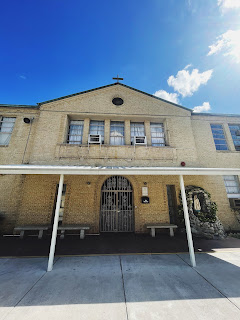DECEMBER 2023 SERVICE REFLECTION: Volunteering at The Shepherd's Market Food Pantry
Total Fall Community Service Hours: 12 hours
Traditional food bank models, while invaluable in addressing hunger, sometimes unintentionally contribute to the stigmatization of those seeking assistance. In a world where dignity and sustenance often stand at odds, the concept of a free shopping market experience within the realm of food banks serves as a beacon of compassion and empowerment. By providing a dignified shopping atmosphere, this model not only addresses immediate hunger but also nurtures a sense of self-worth, affirming that everyone deserves the opportunity to make choices for themselves and their families, even during challenging times. Needless to say, my heart was warmed as I felt the palpable energy-shift from the shoppers: it was as if—even if it was only a small measure- their sense of dignity and choice was restored. During this experience, I was also grateful to be able to translate grocery lists for and help locate items alongside many members of our local Hispanic community. As a former volunteer medical interpreter, my eyes were, once again, opened to language barriers can also serve as barriers to accessing basic human rights such as healthcare and having a nourishing meal for your family. Often times, these inequities are directly correlated to the working conditions and resulting socioeconomic statues that are common for members of the community.
In class this month, we completed our GI and Neoplasia block, during which we had the opportunity to learn about lifestyle and nutrition factors that influence our overall health. In recent years, I have become a fan of the idea that “food is medicine” and have become incredibly interested in the role of our gut health-as well as other lifestyle factors—on ones quality of life and even their gene expression. In MedPharm, we completed an independent studies on H.pylori infections and Irritable Bowl Syndrome and Disease, which can both be aggravated by changes in dietary habits. We also had a lecture pertaining to public health and oncogenesis—or the factors that contribute to cancer development in the general population. It was honestly my favorite lecture thus far. Interestingly, one of the best ways to prevent cancer is to control caloric intake! In regard to my service this month, suddenly, the produce section became a vibrant palette of nutrients. Learning about culinary medicine —or in our case, the pharmacology behind our food—bridges the gap between food and wellness, turning the grocery store into a personalized pharmacy where each item holds the potential to contribute not just to a meal but to our overall health.
As a final note, I am so excited to start 2024 off on a good foot, and look forward to expanding and applying my medical knowledge through pharmacology program next semester!



Comments
Post a Comment